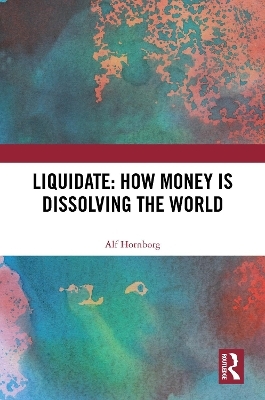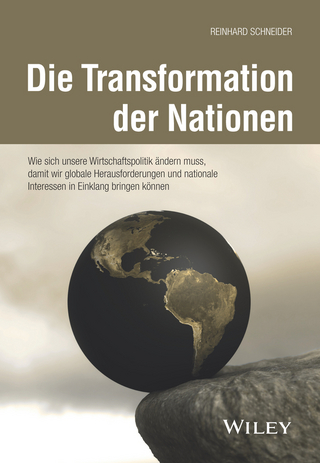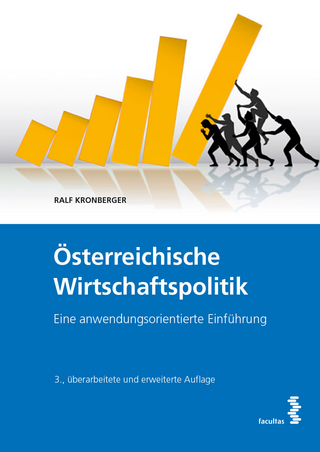
Liquidate: How Money is Dissolving the World
Seiten
2024
Routledge (Verlag)
978-1-032-67996-9 (ISBN)
Routledge (Verlag)
978-1-032-67996-9 (ISBN)
- Lieferbar (Termin unbekannt)
- Versandkostenfrei innerhalb Deutschlands
- Auch auf Rechnung
- Verfügbarkeit in der Filiale vor Ort prüfen
- Artikel merken
Liquidate: How Money is Dissolving the World examines the emergence of money and its social and ecological repercussions. It will be of interest to scholars working in anthropology, sociology, economics, history, semiotics, comparative religions, and indigenous studies.
Liquidate: How Money is Dissolving the World examines the emergence of money and its social and ecological repercussions. It views money as a new phenomenon in the evolution of life that has fundamentally transformed ecosystems and human social relations.
The appearance of coined money around 600 BCE coincided with the first abstract philosophies and religions. This book shows how changes in human–environmental relations have reflected changes in social relations generated by money. The detached modern view of nature mirrors the socially detached modern individual. However, the abandonment of animism has not diminished the human propensity for fetishism – the perception of artefacts such as money tokens as indexes of what they represent. Market prices obscure the asymmetric global resource transfers that make increasingly advanced technologies possible where there is enough money. Our fetishised understandings of money and technologies cannot deal with the escalating production of entropy underlying climate change. They also drive the dramatic reduction of biological and cultural diversity under globalisation. Given these problems, many people reassess premodern and indigenous societies in search of more sustainable ideas on how to organise exchange.
Liquidate: How Money is Dissolving the World will be of interest to scholars working in anthropology, sociology, economics, history, semiotics, comparative religions, and indigenous studies.
Liquidate: How Money is Dissolving the World examines the emergence of money and its social and ecological repercussions. It views money as a new phenomenon in the evolution of life that has fundamentally transformed ecosystems and human social relations.
The appearance of coined money around 600 BCE coincided with the first abstract philosophies and religions. This book shows how changes in human–environmental relations have reflected changes in social relations generated by money. The detached modern view of nature mirrors the socially detached modern individual. However, the abandonment of animism has not diminished the human propensity for fetishism – the perception of artefacts such as money tokens as indexes of what they represent. Market prices obscure the asymmetric global resource transfers that make increasingly advanced technologies possible where there is enough money. Our fetishised understandings of money and technologies cannot deal with the escalating production of entropy underlying climate change. They also drive the dramatic reduction of biological and cultural diversity under globalisation. Given these problems, many people reassess premodern and indigenous societies in search of more sustainable ideas on how to organise exchange.
Liquidate: How Money is Dissolving the World will be of interest to scholars working in anthropology, sociology, economics, history, semiotics, comparative religions, and indigenous studies.
Alf Hornborg is an anthropologist and Professor Emeritus of Human Ecology at Lund University, Sweden.
Part 1 The Semiotics of Money Fetishism 1. The Empty Sign 2. Money and Civilisation 3. The Semiotics of Fetishism Part 2 Money, Materiality, and Entropy 4. Beyond the Veil of Market Prices 5. Technology as Fetish 6. Money, Entropy, and Climate Change Part 3 Diversity, Place, and Resistance 7. The Meltdown of Diversity 8. Civilisation Without Money 9. Visions of Indigenousness 10. Meaningful Money?
| Erscheinungsdatum | 22.10.2024 |
|---|---|
| Verlagsort | London |
| Sprache | englisch |
| Maße | 156 x 234 mm |
| Gewicht | 680 g |
| Themenwelt | Wirtschaft ► Allgemeines / Lexika |
| Wirtschaft ► Volkswirtschaftslehre ► Wirtschaftspolitik | |
| ISBN-10 | 1-032-67996-4 / 1032679964 |
| ISBN-13 | 978-1-032-67996-9 / 9781032679969 |
| Zustand | Neuware |
| Informationen gemäß Produktsicherheitsverordnung (GPSR) | |
| Haben Sie eine Frage zum Produkt? |
Mehr entdecken
aus dem Bereich
aus dem Bereich
Theorie und Anwendung
Buch | Hardcover (2024)
Vahlen, Franz (Verlag)
39,80 €
wie sich unsere Wirtschaftspolitik ändern muss, damit wir globale …
Buch | Hardcover (2024)
Wiley-VCH (Verlag)
39,99 €
Eine anwendungsorientierte Einführung
Buch | Softcover (2024)
Facultas (Verlag)
37,00 €


